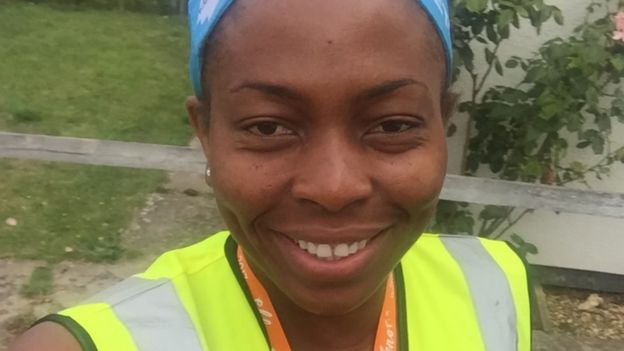Middle-aged people are being urged to walk faster to help stay healthy, amid concern high levels of inactivity may be harming their health.
Officials at Public Health England said the amount of activity people did started to tail off from the age of 40.
They are urging those between the ages of 40 and 60 to start doing regular brisk walks.
Just 10 minutes a day could have a major impact, reducing the risk of early death by 15%, they say.
But PHE estimates four out of every 10 40- to 60-year-olds do not even manage a brisk 10-minute walk each month.
Inactivity in middle age
Adults in England 40-60 years old
41%
Do not manage one brisk 10 min walk per month
1 in 6
Deaths linked to inactivity
- 15% Reduction in risk of early death from at least one brisk 10 min walk per day
- 20% Less active than we were in the 1960s
- 15 miles Less walked a year on average than two decades ago
BBC
To help, the government agency is promoting a free app - Active 10 - which can monitor the amount of brisk walking an individual does and provide tips on how to incorporate more into the daily routine.
PHE deputy medical director Dr Jenny Harries said: "I know first hand that juggling priorities of everyday life often means exercise takes a back seat.
"But walking to the shops instead of driving, or going for a brisk 10-minute walk on your lunch break each day, can add many healthy years to your life."

Maureen has now started leading organised walks
Maureen Ejimofor, 44, started taking regular walks three years ago in a bid to improve her health.
At the time, she weighed 18 stone and wanted to make a change. Within seven months, she had lost nearly five stone.
She joined a local organised walking group in Kent and loved it so much she ended up becoming a walk leader in charge of taking groups of people out at the weekend.
She has been using the Active 10 app and encourages others to do the same, describing it as "really useful" in persuading users to get a "burst" of brisk walking into their day.
Another walking fan is Liam Quigley, who has just turned 60.
"My parents used to take us out walking all the time," he says.
"But unfortunately as I got older, I got a taste for the finer things in life, so I used to drink quite a bit, eat some of the wrong stuff. I actually put a lot of weight on.
"I like walking, and I decided to do something about it."
Mr Quigley joined Stockport Walkers and now takes 10-mile hikes.
"Since I joined, I've lost two stone. It's had a good effect on me," he says.
GPs are also being encouraged to get their patients walking faster - defined as a walk of at least 3mph that leaves you breathing faster and increases your heart rate.
Dr Zoe Williams, of the Royal College of GPs, said: "Every GP should talk to their patients about the benefits of brisk walking and recommend the Active 10 app."
PHE is focusing on those in middle age, because of the drop in activity levels.
It is recommended that people do 150 minutes of activity a week, but nearly half of those aged 40 to 60 fail to achieve that and one in five does less than 30 minutes.
While a daily 10-minute brisk walk will not get them to the recommended level, it will be enough to start making a difference to high blood pressure, diabetes, weight issues, depression and anxiety and musculoskeletal problems such as lower back pain.
PHE also hopes by getting this age group active it will have a knock-on effect among those who have children.
